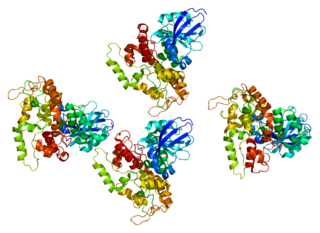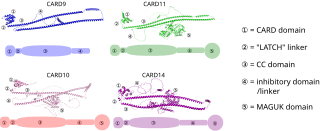Immunodeficiency, also known as immunocompromisation, is a state in which the immune system's ability to fight infectious diseases and cancer is compromised or entirely absent. Most cases are acquired ("secondary") due to extrinsic factors that affect the patient's immune system. Examples of these extrinsic factors include HIV infection and environmental factors, such as nutrition. Immunocompromisation may also be due to genetic diseases/flaws such as SCID.

Bare lymphocyte syndrome is a condition caused by mutations in certain genes of the major histocompatibility complex or involved with the processing and presentation of MHC molecules. It is a form of severe combined immunodeficiency.

Bruton's tyrosine kinase, also known as tyrosine-protein kinase BTK, is a tyrosine kinase that is encoded by the BTK gene in humans. BTK plays a crucial role in B cell development.
Primary immunodeficiencies are disorders in which part of the body's immune system is missing or does not function normally. To be considered a primary immunodeficiency (PID), the immune deficiency must be inborn, not caused by secondary factors such as other disease, drug treatment, or environmental exposure to toxins. Most primary immunodeficiencies are genetic disorders; the majority are diagnosed in children under the age of one, although milder forms may not be recognized until adulthood. While there are over 430 recognized inborn errors of immunity (IEIs) as of 2019, the vast majority of which are PIDs, most are very rare. About 1 in 500 people in the United States are born with a primary immunodeficiency. Immune deficiencies can result in persistent or recurring infections, auto-inflammatory disorders, tumors, and disorders of various organs. There are currently limited treatments available for these conditions; most are specific to a particular type of PID. Research is currently evaluating the use of stem cell transplants (HSCT) and experimental gene therapies as avenues for treatment in limited subsets of PIDs.

ZAP-70 is a protein normally expressed near the surface membrane of lymphocytes. It is most prominently known to be recruited upon antigen binding to the T cell receptor (TCR), and it plays a critical role in T cell signaling.

Mevalonate kinase deficiency (MKD) is an autosomal recessive metabolic disorder that disrupts the biosynthesis of cholesterol and isoprenoids. It is a very rare genetic disease.

Signal transducer and activator of transcription 1 (STAT1) is a transcription factor which in humans is encoded by the STAT1 gene. It is a member of the STAT protein family.

Tyrosine-protein kinase JAK3 is a tyrosine kinase enzyme that in humans is encoded by the JAK3 gene.
An immune disorder is a dysfunction of the immune system. These disorders can be characterized in several different ways:

Dedicator of cytokinesis protein 8 (Dock8) is a large protein encoded in the human by the DOCK8 gene, involved in intracellular signalling networks. It is a member of the DOCK-C subfamily of the DOCK family of guanine nucleotide exchange factors (GEFs) which function as activators of small G-proteins.

Zymogen Granule Protein 16 is a protein that is encoded by the ZG16 gene. Other common names include hZG16, FLJ43571, FLJ92276, secretory lectin ZG16, jacalin-like lectin domain containing, JCLN, JCLN1, MGC183567, MGC34820, ZG16A, zymogen granule membrane protein 16, zymogen granule protein 16 homolog, and zymogen granule protein. The gene is located on Chromosome 16: 29,778,256-29,782,973. The gene obtains one transcript and 128 orthologues.

Caspase recruitment domain-containing protein 9 is an adaptor protein of the CARD-CC protein family, which in humans is encoded by the CARD9 gene. It mediates signals from pattern recognition receptors to activate pro-inflammatory and anti-inflammatory cytokines, regulating inflammation. Homozygous mutations in CARD9 are associated with defective innate immunity against yeasts, like Candida and dermatophytes.

Lipopolysaccharide-responsive and beige-like anchor protein is a protein that in humans is encoded by the LRBA gene.
JAK3 deficiency is a dysfunction in cytokine receptor signalling and their production of cytokines.

Reticular dysgenesis (RD) is a rare, inherited autosomal recessive disease that results in immunodeficiency. Individuals with RD have mutations in both copies of the AK2 gene. Mutations in this gene lead to absence of AK2 protein. AK2 protein allows hematopoietic stem cells to differentiate and proliferate. Hematopoietic stem cells give rise to blood cells.
An innate immune defect is a defect in the innate immune response that blunts the response to infection. These defects may occur in monocytes, neutrophils, natural killer cells, basophils, mast cells or complement proteins.

The CARD-CC protein family is defined by an evolutionary conserved "caspase activation and recruitment domain" (CARD) and a coiled-coil (CC) domain. Coiled-coils (CC) act as oligomerization domains for many proteins such as structural and motor proteins, and transcription factors. This means that monomers are converted to macromolecular complexes by polymerization. In humans and other jawed vertebrates, the family consists of CARD9 and the three "CARD-containing MAGUK protein" (CARMA) proteins CARD11 (CARMA1), CARD14 (CARMA2) and CARD10 (CARMA3). Although the MAGUK protein DLG5 contains both a CARD domain and a CC domain, it does not belong to the same family as the CARD-CC proteins since the evolutionary origin of its CARD domain is very likely to be different.

Aleixo M. Muise is a Canadian scientist, pediatrician and gastroenterologist known for contributions to the understanding of very early onset inflammatory bowel disease. He is a professor of pediatrics at the University of Toronto, a Tier 1 Canada Research Chair in pediatric inflammatory bowel disease, and a pediatric gastroenterologist at the Hospital for Sick Children.
Autoinflammatory diseases (AIDs) are a group of rare disorders caused by dysfunction of the innate immune system. They are characterized by periodic or chronic systemic inflammation, usually without the involvement of adaptive immunity.














